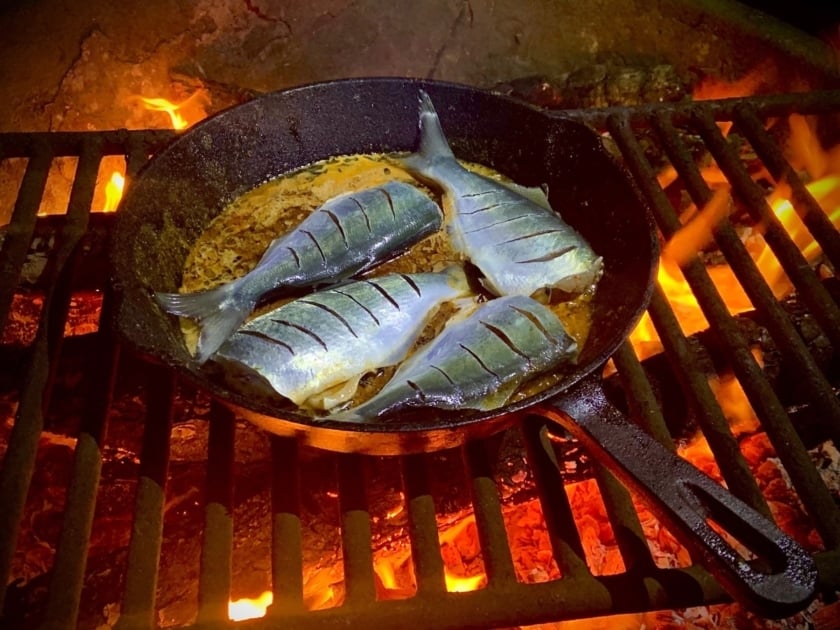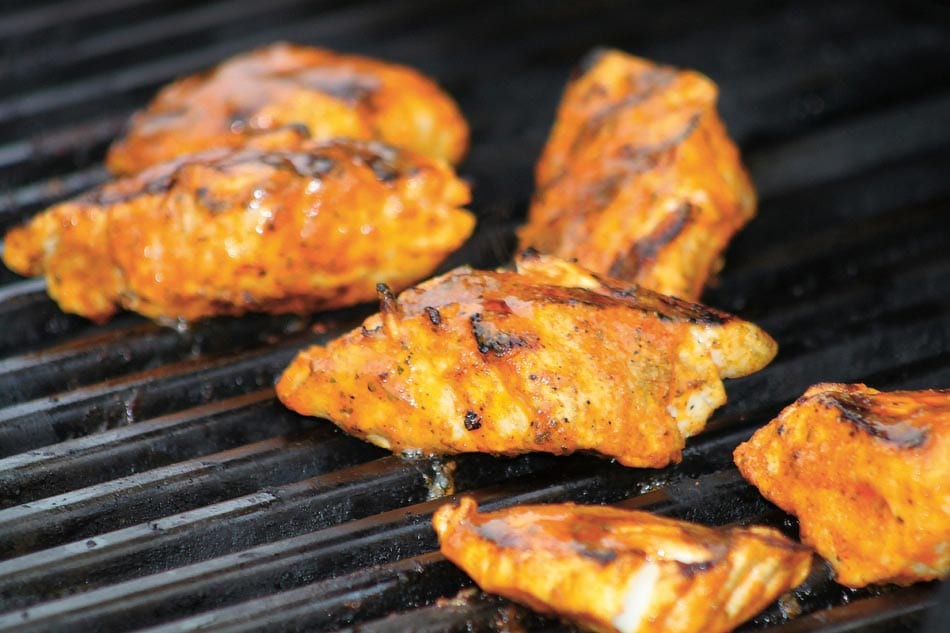10 Tips For Grilling Fish (and Recipe)

Ever catch a fish and want to cook it, but you aren’t sure how? Here are 10 tips for grilling fish. Plus, the perfect (spicy) grilled fish recipe.
10 Tips for Grilling Fish
Preparing a meal of freshly caught fish over a hot grill provides primal satisfaction. Searing meat over fire is an ancient cooking technique that gives us an excuse to reminisce on the glory of a successful capture by kicking back and staring at the flames of a fire. Plus, grilling fish imparts unmatched flavor. Combustion, smoke, and a touch of char are like a fine spice that add flavor to a good recipe.
But grilling fish properly presents unique challenges. Most seafood is low in fat, which makes it stick to the grill. The delicate texture makes it difficult to flip without fillets crumbling apart, and intense heat may lead to overcooking.
1) Not all fish is suitable for grilling.
You will want to choose a firm-fleshed fish such as striped bass, halibut, snapper, or grouper. Other fishes suitable for grilling are tuna, mahi, wahoo, tilefish, swordfish, salmon, and arctic char. Soft-fleshed white fish like cod, flounder, haddock, and pollock don’t have much connective tissue in their meat, which means they will likely crumble apart on the grill. If you must cook them on the barbie, consider doing them in a cast-iron skillet placed on the grill.
If you just caught your fish and would like to filet it before grilling, here is a video that shows you how:
Note: If cooking fish with the skin on, the fish must first be scaled before filleting (unless it is a fish with very small scales, like mahi, or fish with no scales, like swordfish). Grilling fish with the skin does make it easier, there is less likelihood it will stick to the grates.
If you’re wondering how to scale a fish, it’s pretty easy. Just grab the fish by its tail (wrap the tail in a paper towel for a better grip) and use the dull side of a butter knife to scape the scales in the opposite direction (starting at the tail and working your way towards the head). The scales will come right off.
Just be mindful that this process can be very messy. If you have a deep sink, it can help with keeping the scales contained. Hold the tail at the sink’s edge and allow the fish to fall towards the drain. When you have finished scaling both sides of the fish, lay it flat and check to make sure the scales have been removed by rubbing your fingers along the body in the opposite direction. If you feel stubble you may need to scale it again.
2) Get the grill super hot.
Fish, more than any other protein, has a high–water content. This makes it challenging to achieve a good sear—which is how you get great flavor. When grilling fish fillets, it’s best to cook on very high heat, making sure to preheat the grill for at least 15 minutes. Sear the presentation side of the fillet (the side that you will show when you put it on a plate) for a majority of the cooking time to get some nice grill marks on it. As a general rule, cook this side for two thirds of the total grilling time. (See estimated grilling times below.)
Note: Charcoal grills tend to be better than gas grill for cooking fish because they get hotter. It’s more work and takes a while to get one going, but it delivers a better final product. Charcoal can crank out over 700 degrees of heat, while the typical gas grill maxes out around 500 degrees.
3) Don’t overcook it!
Thinner fillets are best grilled when they are cold, thicker fillets should be brought to room temperature before cooking. As a general rule, grill fish 10 minutes for every inch of thickness. Most fish are done when they reach 145 degrees. (Tuna should be cooked medium rare and pulled at 110 degrees.) Just go for one good set of grill marks, flip the fish, then lower the heat for the remaining cooking time. While cross-hatched grill marks look pretty, by the time you achieve them, unless it’s a very thick cut, the fish will likely be overcooked.
Note: Use a thin, flexible spatula for best results!
4) Dry fish fillets grill better than wet ones.
Dust filets in salt, then wrap them up with paper towels and let them rest for a few minutes. This draws out excessive moisture.
5) Clean the grill grates and coat them in vegetable oil.
The cleaner your grill grates, the less chance that your fish will stick to them. Preheat your grill and give it a thorough scrubbing with a wire brush. Just before adding your fish, give the grates a coating of vegetable oil. You can apply it to a rag and rub it on with a pair of tongs, or if you would rather live on the wild side, reduce the heat to low and spray the grates with cooking spray. (Warning: Spraying the grates with oil can lead to a burst of flames, so stand back and release the spray in short bursts.) Brushing a light coat of oil on the fish will also help prevent it from sticking.
6) Small pieces of fish are easier to manage on the grill than big ones.
Instead of trying to serve one big piece of fish, consider serving two or three small ones. The bigger the fillet, the harder it is to flip, and the greater the odds of it breaking apart.

7) Don’t rush it.
Trying to flip fish before it is ready is another common mistake that will result in it sticking to the grill. Once it develops a nice set of grill marks, fish should easily release from the grates. The more you move, poke, and/or prod it, the less time it has to develop these grill marks. I’ll usually place the fillets on a hot grill and let them cook on high heat for at least 4 to 5 minutes before touching them.
8) Use the right tools.
That spatula you use to flip hamburgers is not the best tool for flipping a delicate piece of fish. Working with a pair of flexible fish spatulas is a better way to go. Their thin, flexible metal is better suited for flipping fish, and by using two of them, you reduce the chances of breaking fillets.
9) Use a cast iron skillet while grilling at camp.
If you are cooking over an open campfire, utilizing a cast-iron skillet can make cooking fish a lot easier. They key is to get the pan very hot before adding the fish. Preheating it until the pan’s handle is hot to the touch is the easiest way to tell when it’s ready.
10) Avoid marinades with sugar in them.
High sugar content mixed with high heat results in your fish sticking to the grates. If you want to add a touch of sweetness to your dish, apply a finishing sauce after the fish has been grilled.
Perfect (Spicy) Grilled Fish Recipe
Equipment:
- 1 charcoal grill (or gas grill)
- 1 spatula (thin and flexible is best for grilling fish)
- cast iron pan if needed (see above.)
Ingredients:
- 1 fillet firm-fleshed fish (skinned)
- 4 tbs melted butter (or olive oil)
- ¼ cup lime juice
- ⅓ cup Frank’s Red Hot sauce
- ½ tsp garlic powder
Instructions:
- Over low heat, melt the butter in a metal baking dish.
- Stir in the lime juice, hot sauce, and garlic powder.
- Cut the fillets into 3-inch pieces. (This will make them easier to grill and give them more surface area for the sauce.)
- Add fish fillet pieces to the pan and marinate for a few minutes. (Keep the pan warm or the butter will congeal.)
- Grill the fish on high heat for about 5 to 10 minutes, basting with the excess marinade as you go. (The melted butter will cause flare-ups on the grill that will help get a nice char on the fish.)
- Once the fish is cooked, heat the reserved marinade until the butter is melted, whisk it, and drizzle on top before serving.
- Season the fish with salt and pepper to taste.
Join the conversation
Have you ever grilled your own fresh-caught fish before?
Have you tried this recipe?
Let us know in the comments below!

Andy Nabreski
Andy Nabreski is a journalist based in Cape Cod. He spends most of his free time fishing, hunting, foraging, gardening, digging clams, raising chickens and bees, and occasionally even scavenging in his eternal quest to find a free meal. He writes a monthly food column for On The Water magazine.

